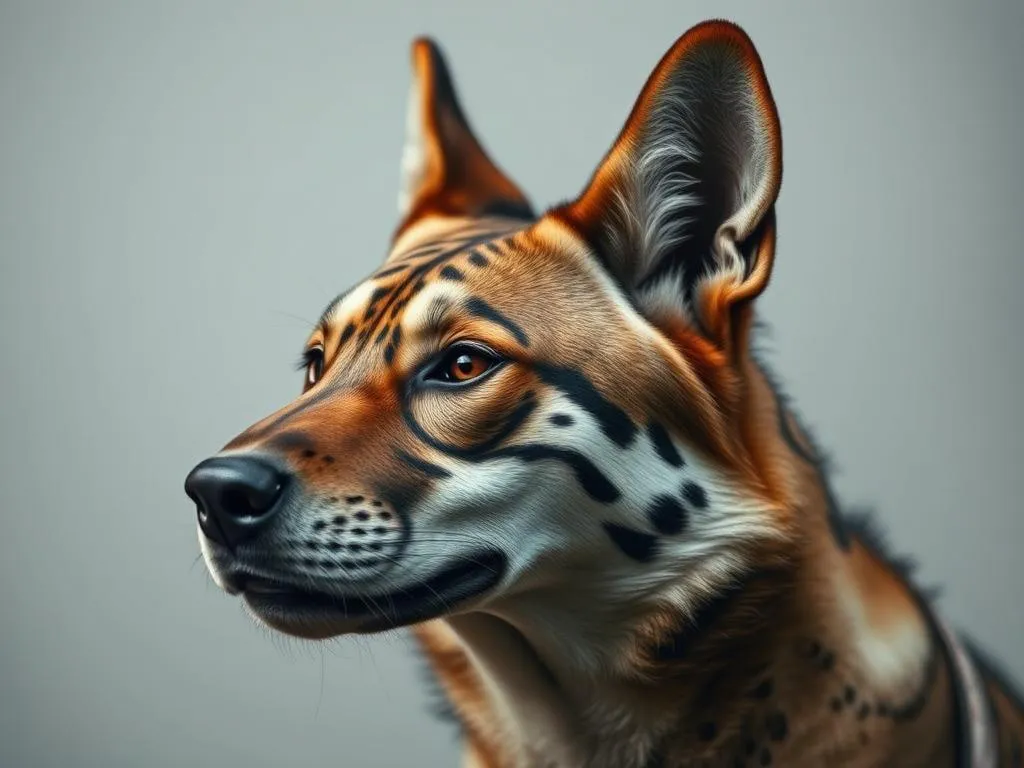
Introduction
In the fascinating world of animal genetics, hybridization often captures our imagination. Jackal dog hybrids are a particularly intriguing topic among animal enthusiasts and pet owners. But what exactly are these hybrids? To clarify, hybrids are the offspring resulting from the crossbreeding of two different species or subspecies. In this case, we are looking at jackals, a wild canine species, and domestic dogs, which have been companions to humans for thousands of years.
The purpose of this article is to explore the existence and characteristics of jackal-dog hybrids. Understanding these hybrids is essential not only for those considering them as pets, but also for conservationists and animal rights advocates. Throughout this post, we will delve into the biology, legality, and lifestyle implications of these unique creatures.
Understanding Jackals and Dogs
Overview of Jackals
Jackals are wild canines that belong to the genus Canis, which also includes dogs and wolves. There are several species of jackals, the most notable being the golden jackal, black-backed jackal, and side-striped jackal. Each species has adapted to its environment, demonstrating unique behaviors and social structures.
- Golden Jackal: Found in North Africa, the Middle East, and South Asia, this species is known for its adaptability and opportunistic feeding habits.
- Black-Backed Jackal: Native to southern and eastern Africa, it is easily recognizable by its distinct black back and is often seen in pairs or small family groups.
- Side-Striped Jackal: This species prefers dense vegetation and is less commonly observed than its relatives.
Jackals typically inhabit savannas, forests, and grasslands, and they are known for their vocalizations and social behaviors, often communicating through a series of barks and howls.
Overview of Domestic Dogs
Domestic dogs (Canis lupus familiaris) are descendants of wolves and have been domesticated for thousands of years. The domestication process has resulted in a vast diversity of dog breeds, each with unique characteristics. From the tiny Chihuahua to the massive Great Dane, dogs have been bred for various purposes, including herding, hunting, and companionship.
- Diversity in Breeds: The American Kennel Club recognizes over 190 dog breeds, with each breed exhibiting specific traits that may influence the potential for hybridization.
- Behavioral Traits: Dogs are generally known for their loyalty, trainability, and ability to bond with humans, making them popular pets worldwide.
Understanding the fundamental differences and similarities between jackals and dogs sets the stage for discussing hybrids.
What Are Hybrids?
Definition of Hybrids
In biological terms, a hybrid is the offspring produced from the mating of two genetically distinct individuals. Hybridization can occur in various animal species, often leading to unique physical and behavioral traits. In the context of canines, hybrids may occur naturally or be human-facilitated through selective breeding.
Common Animal Hybrids
Hybrids are not uncommon in the animal kingdom. Some well-known examples include:
- Wolf-Dog Hybrids: These hybrids are created by breeding domestic dogs with wolves, resulting in a mix of wild and domestic traits.
- Ligers: The offspring of a male lion and a female tiger, ligers are known for their impressive size and unique color patterns.
- Zebroids: A cross between zebras and other equine species, zebroids exhibit distinct stripes and unique patterns.
These examples demonstrate the wide variety of hybrids that exist, raising the question: are jackal dog hybrids real?
Are Jackal-Dog Hybrids Real?
Scientific Evidence
The existence of jackal dog hybrids has been a topic of scientific interest, although evidence remains limited. Research studies focusing on the genetic compatibility of jackals and dogs indicate that, theoretically, hybrids are possible. The genetic similarities between the two species suggest that hybridization could occur under specific circumstances.
A few studies have examined the interactions between jackals and domestic dogs in various environments. For instance, in regions where jackals and feral dogs coexist, there have been reports of hybridization. However, such occurrences are not widely documented or studied extensively.
Anecdotal Evidence
In addition to scientific studies, anecdotal evidence from individuals claiming to encounter jackal-dog hybrids adds another layer of intrigue. Some pet owners have reported adopting dogs with jackal-like features, leading them to believe they might have a hybrid on their hands.
Furthermore, cultural references in folklore and media often depict jackal-dog hybrids, enhancing the mystique surrounding these animals. Stories of shape-shifting jackals or canine-like creatures in various mythologies may contribute to the perception that such hybrids exist.
Characteristics of Jackal-Dog Hybrids
Physical Traits
If jackal-dog hybrids are indeed real, they would likely exhibit a blend of physical traits from both parent species. Some potential characteristics of these hybrids might include:
- Appearance: Typically, hybrids would have a lean, athletic body structure resembling that of jackals. Their fur color could range from the golden hues of a jackal to various colors seen in domestic dogs.
- Size: Hybrids may fall in size between a standard domestic dog and a jackal, potentially making them larger than most dog breeds but smaller than larger wild canines.
Behavioral Traits
The behavioral traits of jackal dog hybrids would likely be influenced by both their wild and domesticated lineage. Some key aspects to consider include:
- Temperament: Hybrids may exhibit a mix of wild instincts and domesticated behaviors. While they might retain the loyalty and affection of a dog, they could also display more independent and territorial behaviors akin to jackals.
- Training and Socialization: Training a jackal-dog hybrid could present unique challenges. The wild nature of jackals may result in a less predictable temperament, making socialization and obedience training more difficult compared to traditional dog breeds.
Legal and Ethical Considerations
Legality of Keeping Hybrids
The legality of owning jackal dog hybrids varies significantly by region. In some countries, ownership of any hybrid animal, including those that involve wild species, may be strictly regulated or prohibited. Potential owners should research local laws to ensure compliance before considering such a hybrid as a pet.
Ethical Concerns
The ethical implications of breeding and owning hybrids are worth discussing. Some of the primary concerns include:
- Welfare of Hybrids: Hybrids may face challenges in finding suitable homes and may struggle with health issues stemming from their mixed genetics. Additionally, they may not adapt well to domestic life, leading to potential abandonment or neglect.
- Conservation Issues: The hybridization of jackals with domestic dogs raises concerns about the impact on wild populations. The introduction of hybrids into the wild could disrupt local ecosystems and affect the genetic integrity of jackal populations.
Lifestyle Implications
Owning a Jackal-Dog Hybrid
For those considering the ownership of a jackal dog hybrid, several factors must be taken into account:
- Considerations for Potential Owners: Prospective owners should weigh the pros and cons. While the uniqueness of a hybrid can be appealing, the potential behavioral and training challenges may not make them suitable for all households.
- Time and Commitment: Owners will need to invest significant time in training and socialization to ensure a well-adjusted pet.
Hybrid vs. Purebred Dogs
When comparing ownership of hybrids to purebred dogs, several lifestyle differences emerge:
- Socialization Needs: Hybrids may require more intensive socialization compared to traditional dog breeds, which could be a barrier for busy individuals or families.
- Activities: Hybrids may have higher energy levels and require more physical activity, making them suitable for active households that can provide ample exercise and stimulation.
Conclusion
In summary, the question of whether jackal dog hybrids are real remains complex. While scientific evidence supports the possibility of hybridization, documentation is limited, and anecdotal claims abound. Understanding the characteristics, legalities, and ethical considerations surrounding these hybrids is crucial for those interested in them as pets.
As the interest in unique pets continues to grow, it is vital to approach the topic of jackal dog hybrids with thoughtful consideration and research. Whether for conservation, companionship, or curiosity, recognizing the implications of hybridization is essential for responsible ownership and ethical practices in the pet industry.









